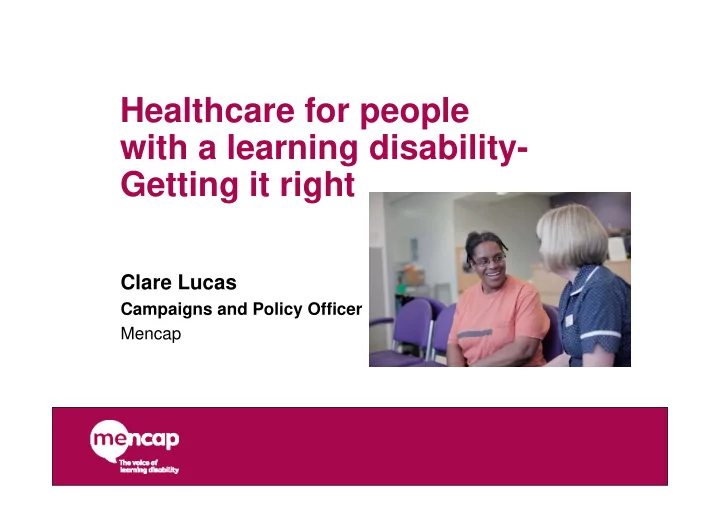

Healthcare for people with a learning disability- Getting it right Clare Lucas Campaigns and Policy Officer Mencap
What we will be talking about • What is a learning disability ? • Why is health an important issue for people with a learning disability? • What happens when healthcare goes wrong for people with a learning disability? • What does good healthcare look like? • What change is needed?
What is a learning disability? “a reduced intellectual ability and difficulty with everyday activities…which affects someone for their whole life. People with a learning disability tend to take longer to learn and may need support to develop new skills, understand complex information and interact with other people.”
What causes a learning disability? • A learning disability occurs when the brain is still developing - before, during or soon after birth. • Before birth things can happen to the central nervous system (the brain and spinal cord) that can cause a learning disability. A child can be born with a learning disability if the mother has an accident or illness while she is pregnant, or if the unborn baby develops certain genes. • A person can be born with a learning disability if he or she does not get enough oxygen during childbirth, or is born too early. • After birth, a learning disability can be caused by early childhood illnesses.
Why do Mencap campaign on health? • People with a learning disability are at least twice as likely as other people to go into hospital in a year • Those who go into hospital are twice as likely to be admitted three times or more in that year • Their hospital stays are roughly 25% longer • People with a learning disability are 58 times more likely to die before their 50 th birthday • Mencap have had almost 100 avoidable deaths reported to us since 2002
Associated medical conditions • Epilepsy: 22% of people with a learning disability compared to 1% in the general population • Dementia: 21.6% of people with a learning disability compared to 5.7% of the general population • Schizophrenia: 3% of people with a learning disability compared with 1% of the general population • Visual impairments: More likely ( 8.5 to 200 times ) to have vision impairment • Hearing impairment: 40% have hearing impairments • Poor dental hygiene and dental care with 36.5% of adults and 80% of adults with Down’s syndrome having unhealthy teeth and gums
Common problems when accessing healthcare
What happens when healthcare goes wrong for people with a learning disability? • Where health care needs are greater, the response should be greater •People with a learning disability have increased health needs but continue to receive poorer health care • Mencap have heard many stories from families about NHS failures • In some cases, poor healthcare was resulting in people dying “prematurely”
Institutional discrimination Institutional discrimination happens when the people working in a place or organisation do not : • value all people equally • understand that different people have different needs • change the way they deliver a service so that it meets different needs This happens for a long time and staff become used to it and do not notice it is wrong.
Recent data: The Confidential Inquiry • The Confidential Inquiry looked at the deaths of 247 people with a learning disability • On average, men with a learning disability died 13 years earlier and women with a learning disability died 20 years earlier 37% of the deaths could have been avoided with good • healthcare • Scaling up, this means 1,200 people with a learning disability are dying prematurely every year. That’s almost 25 people per week. • Lots of people had died because their illnesses were not diagnosed or treated properly
What does good healthcare look like?
What needs to change?
Other things we want to see… • Standardisation of annual health checks • Better healthcare planning • Wider use of hospital passports; they save lives!
Other things we want to see… • Better data collection and the introduction of a flagging system for patients with a learning disability • Better monitoring and regulation of healthcare settings • Continued funding for the Public Health Observatory and a Mortality Review
Kyle’s Story
What nurses and midwives can do? • Take the time to get to know their patients as people; see the person, not the disability • Think of any reasonable adjustments that can be made • Check if patients have a hospital passport or health action plan Use accessible language in written and spoken communication • • Listen to the person and their family/carers • Learn about Mental Capacity Laws
Useful resources • IHAL- http://www.improvinghealthandlives.org.uk/ • Confidential Inquiry- http://www.bris.ac.uk/cipold/ • GMC- http://www.gmc-uk.org/learningdisabilities/ • RCGP- http://www.rcgp.org.uk/learningdisabilities • RCN- https://www.rcn.org.uk/learning_disabilities • EasyHealth- http://www.easyhealth.org.uk/
For more information Visit our website www.mencap.org.uk/deathbyindifference www.mencap.org.uk/gettingitright Or email clare.lucas@mencap.org.uk
Any questions?
Recommend
More recommend